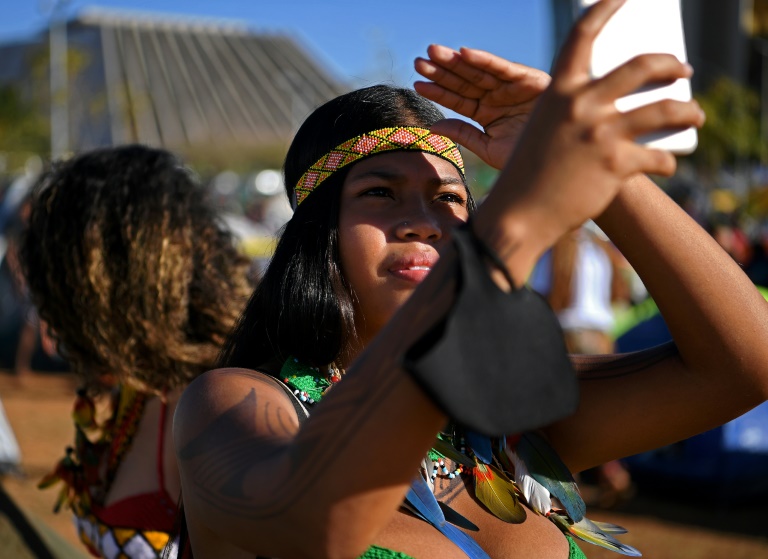With feather headdresses, grass skirts and body paint, thousands of indigenous demonstrators camped out in Brazil’s capital Monday to protest far-right President Jair Bolsonaro’s policies and an initiative that could take away their ancestral lands.
Pounding wooden tent poles into the ground, the protesters set up the “Fight for Life” camp outside the seat of power in Brasilia, near the trio of modernist buildings housing the presidency, Congress and the Supreme Court.
The protest camp, which opened Sunday, will hold a week of demos and other activities against what the organizers, the Association of Indigenous Peoples of Brazil (APIB), call Bolsonaro’s “anti-indigenous agenda,” seeking to exert pressure ahead of a crucial Supreme Court ruling on native lands.
“We’re living in a time of much oppression, of setbacks on the protections and laws the indigenous movement has fought so hard for all these years,” APIB representative Kleber Karipuna told AFP.
Indigenous groups in Brazil accuse Bolsonaro of systematically attacking their rights and trying to open their lands to agribusiness and mining.
A similar protest in June erupted into clashes, with three indigenous demonstrators injured and three police wounded by arrows.
The latest camp opened peacefully. Organizers said there were 4,000 indigenous protesters from 117 ethnic groups.
– ‘Case of the century’ –
The tension has peaked with a Supreme Court case opening Wednesday on the issue of how indigenous lands are protected.
The agribusiness lobby argues Brazil’s constitutional protection of indigenous lands should only apply to those whose inhabitants were present in 1988, when the current constitution was adopted.
However, indigenous rights activists say native inhabitants were often forced off their ancestral lands, including under Brazil’s 1964-1985 military dictatorship, which wanted to develop the Amazon rainforest.
Having now returned, they should have the right to benefit from the protected status of official reservations, their lawyers argue.
The case centers on a reservation in the southern state of Santa Catarina, but will set legal precedent for dozens of similar cases throughout Brazil.
Protest organizers called it “the most important court case of the century.”
“If the Supreme Court accepts the so-called… ‘time frame’ argument in its ruling on land demarcation later this month, it could legitimize violence against indigenous peoples and inflame conflicts in the Amazon rainforest and other areas,” the United Nations special rapporteur on the rights of indigenous peoples, Francisco Cali Tzay, said in a statement.
On the other hand, if the ruling goes in the indigenous groups’ favor, it could also deflate a bill before Congress that would enshrine the 1988 “time-frame argument” in law.
That bill, which passed a lower house committee vote in June, is one of several that indigenous activists and environmentalists say Bolsonaro and his allies are trying to use to further the advance of agriculture and industry into Brazil’s rapidly disappearing forests.
“It’s a very important case at a time when we are seeing numerous setbacks in terms of indigenous rights,” Juliana de Paula Batista, a lawyer with the Socio-Environmental Institute (ISA), told AFP.
– Surging deforestation –
Brazil is home to around 900,000 indigenous people. They make up less than 0.5 percent of the population of 212 million, but their reservations cover some 13 percent of the country.
Environmentalists say protecting indigenous reservations is one of the best ways to stop the destruction of the Amazon, a critical resource in the race to curb climate change.
Deforestation in the Brazilian Amazon has surged since Bolsonaro took office in 2019. In the 12 months through July, a total of 8,712 square kilometers (3,364 square miles) — an area nearly the size of Puerto Rico — of forest cover was destroyed, according to official figures.









